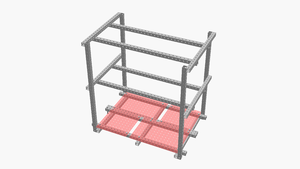Drying racks: Difference between revisions
From
No edit summary |
No edit summary |
||
| Line 1: | Line 1: | ||
{{Projects infobox | {{Projects infobox | ||
|image | |image = Drying-rack.scad.png | ||
|designer | |designer = | ||
|date | |date = | ||
|vitamins = | |vitamins = | ||
|materials = | |materials = | ||
|transformations = | |transformations = | ||
|lifecycles = | |lifecycles = | ||
|tools | |tools = [[Wrenches]] | ||
|parts | |parts = [[Pallets]], [[Harvest hangers]], [[Frames]], [[Nuts]], [[Bolts]], [[End caps]] | ||
|techniques | |techniques = [[Shelf joints]], [[Tri joints]] | ||
|stl | |stl = | ||
|git | |git = | ||
}} | }} | ||
Revision as of 12:17, 26 May 2021
Project: Drying racks
| Tools: | Wrenches |
|---|---|
| Parts: | Pallets, Harvest hangers, Frames, Nuts, Bolts, End caps |
| Techniques: | Shelf joints, Tri joints |
Introduction
Freshly harvested herbs, spices, and other natural products often need to dry before further processing.
Challenges
Racks for the purposes of drying must allow sufficient airflow and make efficient use of 3 dimensional space through modularity and stacking.
Approaches
-
Ken Isaacs pallet
-
EUR pallet
-
Pallet
Building off from pallets allows for drying racks to be easily moved by loading equipment, stacked, and stored or shipped using all the other projects designed to interoperate with pallets.



